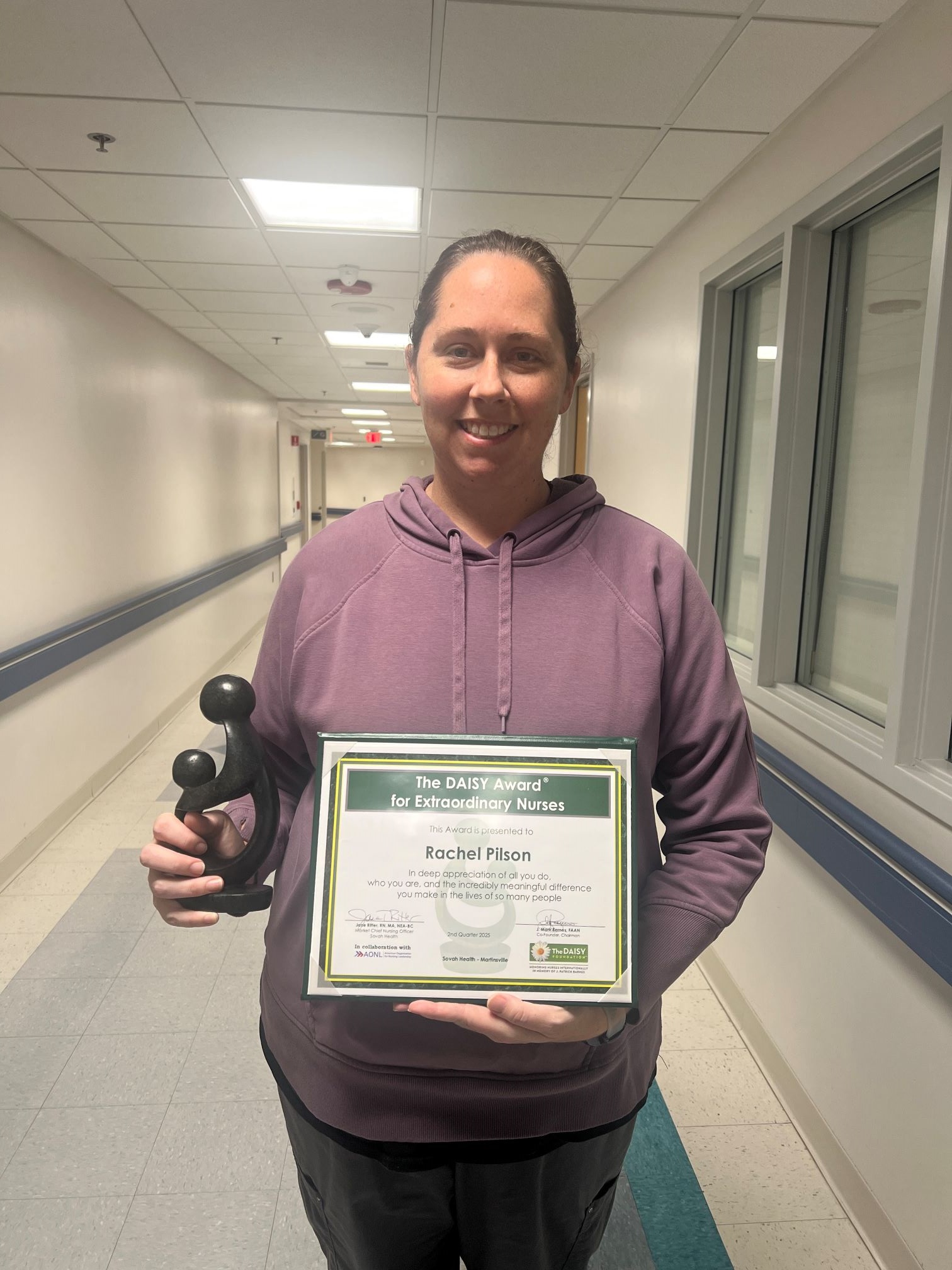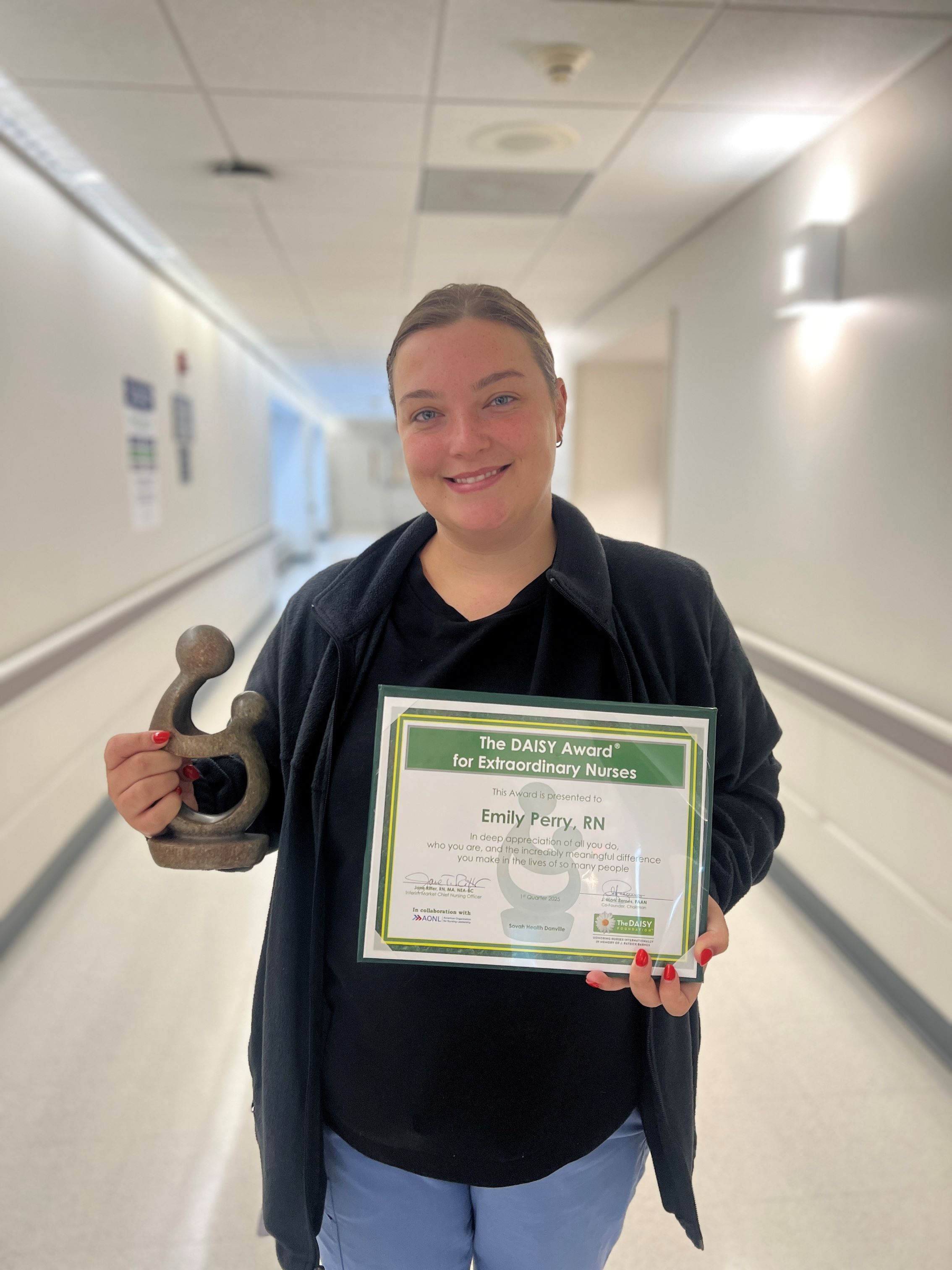News
-

It’s Heart Month! Give your heart the attention it deserves to stay healthy all year long
February 12, 2026By: Brian Zagol, MD, Sovah Health Danville & Jennifer Terry, FNP, Sovah Heart & Vascular - MartinsvilleWith Valentine’s Day just around the corner, hearts seem to be everywhere you look this time of year. That’s why it is especially fitting that February is American Heart Month, a time to raise awareness of heart disease and how we can help prevent it.…
Learn more -

Healthy Habits to Start in 2026 for Better Overall Health
January 19, 2026The beginning of a new year offers a natural opportunity to reassess your health and build habits that help you feel better and stay healthier over time. While big resolutions can feel overwhelming or short-lived, the most effective changes usually come from small, sustainable strategies that are easier to maintain. In…
Learn more -

Fresh Year, Fresh Start: Give your health a jumpstart in 2026 with a fresh approach to healthy eating
January 15, 2026By: Sarah Padgett, FNP-C, Sovah Family Medicine – Market SquareAsk anyone what their New Year’s resolution is and chances are they’ll mention a determination to eat healthier. While many of us may consider a renewed focus on healthy eating as a way to make up for the rich indulgences of the holiday season or as a pathway to fit more comfortably into that…
Learn more -

Sovah Health Welcomes New Nurse Practitioners
January 06, 2026Sovah Health announced today that Megan Hudson, FNP-C and Sarah Padgett, FNP-C has joined Sovah Physician Practices and are providing primary care for Sovah Family Medicine – Market Square in Martinsville. "We are excited to welcome Megan and Sarah to our team,” said Steve Heatherly, Market President of Sovah Health. "Their skills in family medicine and…
Learn more -

Sovah Health Welcomes First Baby of 2026
January 05, 2026Sovah Health is ringing in 2026 with the year’s first bundle of joy. Weighing 5 pounds and 0 ounces and measuring 18 inches, Da’Nasia was born to Shanita Fallen and Daniel Jiggetts, January 1 at 2:49am.
Learn more -

What Your Annual Blood Work Can Reveal About Your Health
December 22, 2025Your yearly blood work gives your provider information they can’t see during a physical exam, sometimes before you notice any symptoms at all. Blood work isn’t only for sick visits – routine lab work plays a key role in preventive care and long-term health. In Southern Virginia, many adults…
Learn more -
.jpg)
Is It a Cold, the Flu, or Something Else? How to Tell the Difference
November 25, 2025When your child starts coughing, sneezing, or running a fever, it can be hard to know what you’re dealing with. As the seasons change and kids head back to school or daycare, coughs and sniffles start making the rounds. Here in Southern Virginia, that often leaves parents asking: is it just a cold, or something more serious like the flu, RSV, or…
Learn more -

Sovah Health Welcomes New Cardiologist
November 20, 2025Sovah Health announced that Varun Kumar, MD, has joined its medical staff and is offering cardiovascular services for patients at Sovah Heart & Vascular – Danville.
Learn more -

Lung Cancer Screening: What You Should Know
November 13, 2025By: Sulaiman Tijani, MD, Sovah Pulmonology – Danville & Jennifer Flinchum, FNP-C, Sovah Pulmonology – Martinsville Lung cancer is the second-most common cancer in the United States, and the most common cause of cancer-related death. Many things can contribute to your risk of developing lung cancer – such as your genes, your family history of…
Learn more -

Sovah Health Honored With Five-Star Ratings for Specialty Care from Healthgrades
October 28, 2025Healthgrades recognizes Sovah Health for exceptional performance in Orthopedics, Gastro, and Critical Care
Learn more -

Sovah Health – Martinsville Honors DAISY Award Winner
October 22, 2025Rachel Pilson, RN of Sovah Health – Martinsville was honored recently with The DAISY Award® For Extraordinary Nurses. The award is part of the DAISY Foundation's programs to recognize the super-human efforts nurses perform every day.
Learn more -

What Does Breast Cancer Look Like in Its Early Stages?
October 21, 2025Breast cancer is one of the most common cancers in women, and early detection can dramatically improve outcomes. But what does breast cancer actually look like in its earliest stages? It’s not always a visible lump – early signs can be subtle, and knowing what to watch for can make all the difference. Below are some common early signs and symptoms to be…
Learn more -

Sovah Health – Danville Honors DAISY Award Winner
October 07, 2025Emily Perry, RN of Sovah Health – Danville was honored recently with The DAISY Award® For Extraordinary Nurses. The award is part of the DAISY Foundation's programs to recognize the super-human efforts nurses perform every day.
Learn more -

Sovah Health Welcomes New Primary Care Provider
September 29, 2025Sovah Health announced that Naga Sudireddy, MD has joined Sovah Physician Practices and is providing primary care for patients at Sovah Internal Medicine – Danville.
Learn more -

Why You Shouldn’t Skip Your Annual Physical: Screenings That Save Lives
September 26, 2025Many people put off their annual physical, if they feel fine, there’s no urgent need to visit the doctor. But skipping your yearly check-up can mean missing the early signs of serious conditions that are often treatable if caught early. At Sovah Health, we believe prevention is just as important as treatment. Your annual physical is a chance to check in…
Learn more -

How to Protect Your Child from Fall Viruses like Flu, RSV, and COVID
September 05, 2025In warmer parts of the country like southern Virginia, respiratory virus season can begin as early as September and stretch well into the winter. With kids back in school, viruses like flu, RSV, and COVID-19 start spreading quickly – especially among young children whose immune systems are still developing. As a parent, you can take steps now to help…
Learn more -

Sovah Health – Martinsville Honors DAISY Award Winner
September 02, 2025Brian Taylor, RN of Sovah Health – Martinsville was honored with The DAISY Award® For Extraordinary Nurses. The award is part of the DAISY Foundation's programs to recognize the super-human efforts nurses perform every day.
Learn more -

Sovah Health – Danville Honors DAISY Award Winner
August 18, 2025Lauren Scearce, RN of Sovah Health – Danville was honored today with The DAISY Award® For Extraordinary Nurses. The award is part of the DAISY Foundation's programs to recognize the super-human efforts nurses perform every day.
Learn more -

Sovah Health Welcomes New Nurse Practitioner
August 13, 2025Sovah Health announced today that Valerie Baines, FNP has joined Sovah Physician Practices and is providing gastroenterology services for Sovah Gastroenterology – Martinsville.
Learn more -
.jpg)
Why Mosquito-Borne Illnesses Are on the Rise — and How to Protect Yourself
August 01, 2025Warmer weather and standing water are fueling a surge in mosquito-borne diseases. Here’s what you need to know and how to prevent them.
Learn more
